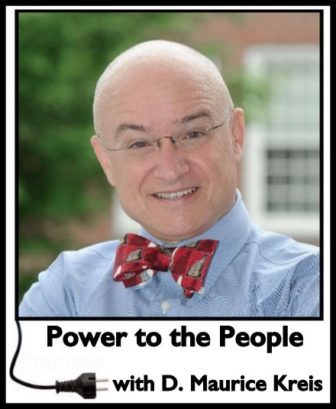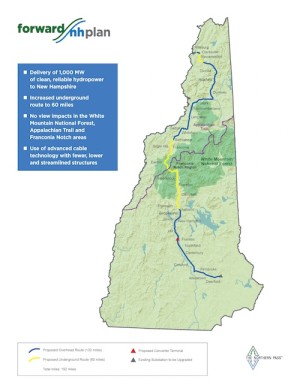Power to the People is a column by D. Maurice Kreis, New Hampshire’s Consumer Advocate. Kreis and his staff of four represent the interests of residential utility customers before the NH Public Utilities Commission and elsewhere. It is co-published by Manchester Ink Link and InDepthNH.org.
By D. Maurice Kreis, Power to the People
Here’s a quiz: Can you name the utility that is scrambling to cut a deal with Massachusetts to deliver Hydro-Quebec power via a new transmission line that would slice through precious wilderness areas, thus earning the ire of environmentalists, while delivering precisely no benefits to New Hampshire utility customers?
If you guessed Eversource or its subsidiary, Northern Pass, you’re wrong. The correct answer is Central Maine Power.
Okay — it was a trick question.

D. Maurice Kreis
Northern Pass has been reeling since the Site Evaluation Committee (SEC) decided on February 1 to conclude its oral deliberations and deny permission to build the transmission project down the center of New Hampshire. The SEC ruled that the proposal to build what, is in effect, a giant extension cord from Quebec to Massachusetts across the middle of New Hampshire would have an undue adverse impact on the orderly development of the region to be occupied by the project.
If you dislike Northern Pass, you should dislike “New England Clean Energy Connect” even more. That’s CMP’s rival project – which would, if built, do to pristine areas in Maine’s rural Franklin and Somerset counties exactly what Northern Pass would do to similar locations in the Granite State.
Northern Pass is in the terminal stages of its state permitting process. The CMP project is still at the starting line when it comes to getting the requisite green light from Maine’s Public Utilities Commission (PUC), Land Use Planning Commission and Department of Environmental Protection.
In late January, Massachusetts declared Northern Pass the winner of public competition for the right to negotiate a contract to sell its output to utilities in the Bay State as part of its so-called “83D” renewable energy procurement program. When things went bad for Northern Pass at the SEC, the folks in Massachusetts officially declared the CMP project Plan B – and announced that they would be negotiating with both projects in an effort to cut some kind of deal with someone by the previously announced decision date of March 27.
CMP’s web site says that if the SEC doesn’t change its mind by March 27, the decisionmakers in Massachusetts will ditch Northern Pass in favor of the Maine project. Eversource has implied there’s a bit more wiggle room than that.
Still, Eversource has managed to convince the SEC to reconvene on Monday (March 12) to take up the company’s motion for rehearing.
As a matter of administrative law, the whole thing feels like it’s in an alternate reality plane. The state’s Administrative Procedure Act contemplates rehearing and appeal of written decisions, not oral deliberations. Whatever the SEC’s final answer turns out to be, appellate proceedings at the New Hampshire Supreme Court are inevitable – but the CMP project isn’t exactly shovel-ready either.
Among the parties litigating at the SEC is the public counsel, who by statute operates under the aegis of the Attorney General “to protect the quality of the environment and in seeking to assure an adequate supply of energy.” That’s analogous to, but somewhat different from, my office’s mission to advance the interests of residential utility customers at the New Hampshire PUC.
So, even though I don’t litigate at the SEC, maybe it falls to me to point out a noteworthy consequence of the latest plot twist in the Northern Pass saga. Eversource has managed to make the project look considerably more attractive from a ratepayer standpoint.
Others can debate the value of the additional concessions Eversource has offered in the areas of land use, business impacts, tourism, and property values. Though not indifferent to these questions personally, I am tasked solely with thinking about impacts on ratepayers as ratepayers.
It is worth reemphasizing that the cost of Northern Pass to ratepayers is zero. Northern Pass is a so-called “participant-funded” transmission project, which in this instance means that Hydro-Quebec (HQ) has agreed to pay for it. Assuming success in Massachusetts, HQ would presumably recover its costs by selling electricity to the utilities in the Bay State.
It is also worth reemphasizing that Eversource’s claim of roughly $60 million a year in benefits to New Hampshire customers via wholesale price suppression has never been persuasive. Yes, if you add 1090 megawatts of HQ power to the region’s wholesale electric market it will reduce prices for customers throughout New England. But rival transmission projects in other states, including CMP’s, would have the same effect.
But here’s a new promise from Eversource: 400,000 megawatts’ worth of Renewable Energy Credits (RECs) a year for 20 years. According to Eversource, it will acquire the RECs from HQ, sell them, and devote the proceeds to helping big commercial and industrial customers (thus making the Business and Industry Association happy) and low-income residential customers.
Cynics will ask: Where was Eversource with all this largesse a year ago?
The answer – in all fairness to Eversource – is that they were at the New Hampshire PUC. Almost exactly a year ago, the PUC rejected a proposal by Eversource to buy 100 megawatts’ worth of HQ energy, to be delivered via Northern Pass, and devote the proceeds to New Hampshire ratepayers.
There were only two things wrong with the failed power purchase agreement. First, the terms were secret. Second, the whole deal was illegal – i.e., inconsistent with New Hampshire’s electric industry restructuring law. The beauty of what Eversource is proposing now: It doesn’t require PUC approval and it doesn’t illegally get Eversource back into the generation business. The Restructuring Act does not prohibit a utility from providing free money to customers.
A year ago, I was sorry I never got to bargain with Eversource on a deal that would make the benefits of that power purchase agreement for residential utility customers iron-clad. Now it looks unlikely we’ll ever get to cut a similar deal with Eversource on those Renewable Energy Credits.
Eversource argues that the value of those RECs is in the neighborhood of $300 million (without adjusting for the time-value of money). I don’t know whether that’s a realistic estimate; REC values fluctuate.
More importantly, I don’t know whether those RECs are enough – in combination with the other concessions Eversource has offered – to justify a different outcome at the SEC. I do know that if CMP gets to build the giant extension cord from Quebec to Massachusetts instead of Eversource, the financial benefits to New Hampshire electric customers will be precisely zero.
That would be nothing for New Hampshire ratepayers to celebrate.





